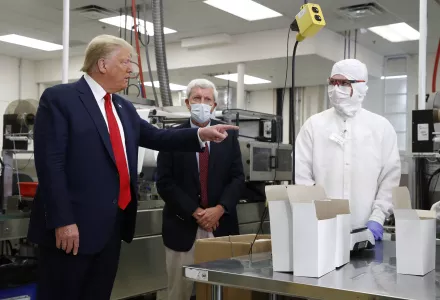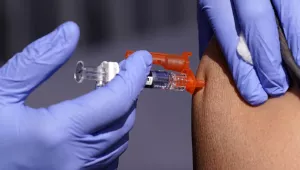
Mr. Trump takes risks for the perfect photograph. He's not alone in that. Hundreds have died seeking the perfect selfie. But the moral calculus is entirely different. Mr. Trump isn't bearing the risk. Mr. Trump's photo ops are dangerous for everyone else - those standing next to him, sitting in front of a church, working at their jobs, or lying in their beds - three feet or three thousand miles away.
The now infamous example of President Trump's use of force to disperse peaceful demonstrators so he could pose with a Bible and military leadership in front of St. John's church is the most extreme of his photo ops so far. But it is only one in a series that shows what could most charitably be called the president's reckless disregard for his fellow Americans.
When Mr. Trump pushes hard for a Republican convention with 50,000 attendees and no social distancing, so that the photographs of his nomination will show no empty seats, he is sacrificing the health and lives of attendees, staff, and those in the communities they will return to. There should be no doubt about the likely results. More than 100 out of 175 were infected at the Boston Biogen conference in late February. It quickly catapulted Massachusetts to one of the highest rates of infection in the country, now with more than 100,000 casesconfirmed, and more than 7,200 deaths. In 1918 during the Spanish influenza pandemic, when Philadelphia didn't cancel a parade, 200,000 people gathered. Within six weeks, more than 12,000 people died there from the disease. In St. Louis, a city that cancelled its parade, the death toll never passed 700.
When Mr. Trump tours manufacturing plants, chatting bare-faced to workers and interfering with production, he worsens the nationwide shortages of critical supplies needed to fight the pandemic. On Friday, he toured one of the only two facilities that make the COVID-19 testing swabs that we don't have enough of. The company said they will destroy all the swabs made that day.
Even Mr. Trump's choice to not wear a mask puts lives at risk. It directly endangers the lives of those factory workers, his staff, and everyone else he is in close contact with. Although he is tested daily, he could be asymptomatic and infectious. But the impact goes far beyond that. Mr. Trump indirectly endangers many, many people by the example he sets in public. His choices affect the choices those watching him will make.
I don't believe Mr. Trump's pictures are more dangerous than his words or his other actions, but I do believe they are dangerous, and revealing.
As a nation, we are standing on a crumbling precipice. We are not here for a souvenir picture. We don't want our friends back home to know how daring we are. We are praying for a way to step back from the edge, together.
We must find our way. We do not need to find it alone. We cannot.
This president will not willingly help us, but in rejecting Mr. Trump's photo ops, perhaps at last we have found a catalyst for change. In eloquently and publicly condemning the president's actions at St. John's, Episcopal Bishop Mariann Budde, and former secretary of defense, James Mattis, have created space for others to follow.
We see that it is not unthinkable to say out loud what we fear and what we believe. We see it is not impossible to say publicly, what we only whisper in private.
Bishop Budde and General Mattis are not the first to challenge Mr. Trump. Many have and suffered from it. Many others are afraid to try. But let this be the turning point. Each voice must be followed by another, each making it a little easier for the next one to speak. Together, we are strong.
Mr. Trump has failed us. He has divided us. Prominent Republicans are considering not voting for Mr. Trump, but it isn't enough. It is time for public statements, alliances, and actions from all corners that make it perfectly clear. We are one country. We will not sow discord among or declare war on the American people or allow others to do so, no matter what office they hold.
Gretchen Greene is a Fellow with Harvard Kennedy School's Belfer Center for Science and International Affairs and a Senior Advisor for The Hastings Center.
Statements and views expressed in this commentary are solely those of the author and do not imply endorsement by Harvard University, Harvard Kennedy School, or the Belfer Center for Science and International Affairs.
Greene, Gretchen. “We Must Say Out Loud What We Fear and What We Believe.” Belfer Center for Science and International Affairs, Harvard Kennedy School, June 10, 2020





